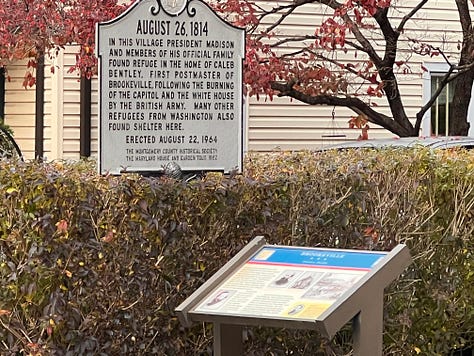A Visit to Brookville, Maryland
Capital of the United States for one day when the White House burned
Good Evening:



The other day, I posted a picture of the Octagon House—the beautiful early Washington House to which James and Dolly Madison decamped when the British burned the White House during the War of 1812:
It is, these days, the most symbolically important building in Washington—a symbol of democracy’s resilience when the White House is, say, bulldozed.
But before President Madison returned to Washington and moved into the Octagon House, he actually fled town for a few days. He went out to a small hamlet called Brookville, MD, to which the estimable Alicia Wanless and I made a pilgrimage the other day. Wanless is a bit of a War of 1812 buff, albeit from a Canadian nationalist perspective. So I thought I would take her to a town that proudly declares itself as having been the capital of the United States for one day in 1814.
There is only one building still standing that dates from that era, the so-called Brookville Academy, a picture of which is above. The flags that fly in Brookeville have 15 stars and 15 stripes, reflecting the flag of the time of Francis Scott Key. Madison actually stayed at the house of the postmaster, a man named Caleb Bentley, who had played a role in the early construction of the Capitol—which the British had also burned. As the Architect of the Capitol’s web site explains:
In 1793, President George Washington led a ceremony in which he laid [a] plate on the ground and lowered the cornerstone of the U.S. Capitol onto it. The stone was then consecrated with corn, wine and oil in a Masonic ceremony, which also dictated that it be placed in the southeast corner of the building, as the inscription on the silver plate below it describes: “This South East corner stone, of the Capitol of the United States of America in the City of Washington, was laid on the 18th day of September, in the thirteenth year of American Independence, in the first year of the second term of the Presidency of George Washington.”
That plate was crafted by a skilled clockmaker and silversmith named Caleb Bentley, a Quaker who was the first postmaster of Brookeville, a small town in Maryland. On the night of August 26, 1814, a party of soldiers departing the smoldering capital rode into Brookeville, seeking refuge.
Led by Brigadier General John Mason, Commander of the District of Columbia militia, they were turned away at the first home they inquired at, even after offering to sleep on the floor. Bentley, however, agreed to shelter the soldiers. When the party dismounted, Bentley was astonished to be introduced by General Mason to the President of the United States.
And so before returning to Washington, D.C., the President spent a day in the home of the man who crafted the silver plate that George Washington placed under the U.S. Capitol cornerstone. Brookeville, which also safeguarded the papers of the U.S. Senate until it could find a suitable place to meet, still proudly proclaims that it was the “U.S. Capital For a Day” and flies the 15-stripe Star-Spangled Banner from lampposts throughout the year.
Yesterday on #DogShirtTV, the estimable Holly Berkley Fletcher and I discussed various Africa-related news items, most of them depressing:
Several readers have urged me to post video of Holly’s recent book events. I am delighted to do so:
Also, here are her thoughts on “The Poisonwood Bible” after rereading it for the MARA Book Club the other day:
Yesterday On Lawfare
Compiled by the estimable Isabel Arroyo
Offensive Cyber Operations and Combat Effectiveness After Ukraine
Stefan Soesanto and Wiktoria Gajos urge Western powers—despite commitments to responsible behavior in cyberspace—to learn from Ukraine’s far-ranging, flexible, and creative cyberattacks on Russian military and civilian infrastructure.
As Western democratic nations have been promoting international law and the development of “responsible” behavior in cyberspace, Ukraine’s use of offensive cyber operations has broken Western taboos and legal limitations. Kyiv’s “quantity over quality” approach in cyberspace is casting a wide net of targets to achieve specific strategic goals. And Ukraine has not shied away from attacking civilian infrastructure and militarizing non-state actors, including domestic hacktivists and international volunteers. Russia has subsequently adapted—not always with success. Ukraine’s achievements in the cyber domain show that, while the enduring moral desire to legally bind states to behave responsibly in cyberspace and adhere to international law is certainly commendable, these ambitions stand in stark contrast to the realities of contemporary digital conflict.
Why Trump’s Madman Act Doesn’t Work
In the latest installment of Lawfare’s Foreign Policy Essay series, Samuel Seitz and Caitlin Talmadge argue that President Trump’s deliberately erratic bargaining style degrades trade negotiations’ efficacy without signaling a strategically advantageous indifference to costs.
Of course, for this logic to work, both sides must care about costs. It is this assumption that madman theory seeks to challenge. A madman, after all, is mad. He does not care about costs either because he subscribes to an extreme set of ideological views that weigh costs differently than most or because he is simply irrational and thus incapable of cost-benefit analysis.
In any event, the threat of suffering costs as a result of his actions does not restrain him. Thus, the theory goes, he has an important advantage in negotiating, and the other side, which is sensitive to costs, is compelled to make concessions rather than risk further escalation. To return to the previous example, if the driver of the smaller car is drunk and thus incapable of rationally weighing risks, he may not recognize his opponent’s strength and plow on regardless, perhaps even accelerating! By discounting his own safety, the operator of the smaller car can take actions that impose grievous harm on the other driver, even if he comes off relatively worse, and thus force his opponent to chicken out and swerve. According to madman theory, it is this asymmetric recklessness that grants the small car leverage.
The European Commission’s Rejection of Latombe
Iain Nash analyzes the European Union General Court’s decision to uphold the EU-U.S. Data Privacy Framework (DPF) following a legal challenge from French parliamentarian Philippe Latombe. Nash explains why the court rejected Latombe’s three core arguments and assesses the DPF’s chances of surviving challenges in the future.
Latombe’s action was narrow, rushed, and ultimately unsuccessful. The court’s dismissal of this case vindicates the European Commission for now, but it leaves the DPF politically fragile and legally untested at the Court of Justice of the European Union (CJEU). What’s more, the rejection also leaves the DPF especially vulnerable to shifts in Washington, where the framework rests on a revocable executive order and a shaky oversight board.
Podcasts
On Lawfare Daily, I sit down with Scott R. Anderson, Eric Columbus, Marty Lederman, Roger Parloff, and Loren Voss to discuss how the Supreme Court is handling legal challenges to National Guard federalization in Chicago, James Comey’s motions to dismiss the indictment against him, litigation over the Trump administration’s suspension of SNAP during the shutdown, and more.
Today’s #BeastOfTheDay is the baby flamingo, seen here practicing flamingo skills:
In honor of today’s Beast, congratulate the next toddler you see on their walking abilities.
Keep reading with a 7-day free trial
Subscribe to Dog Shirt Daily to keep reading this post and get 7 days of free access to the full post archives.






